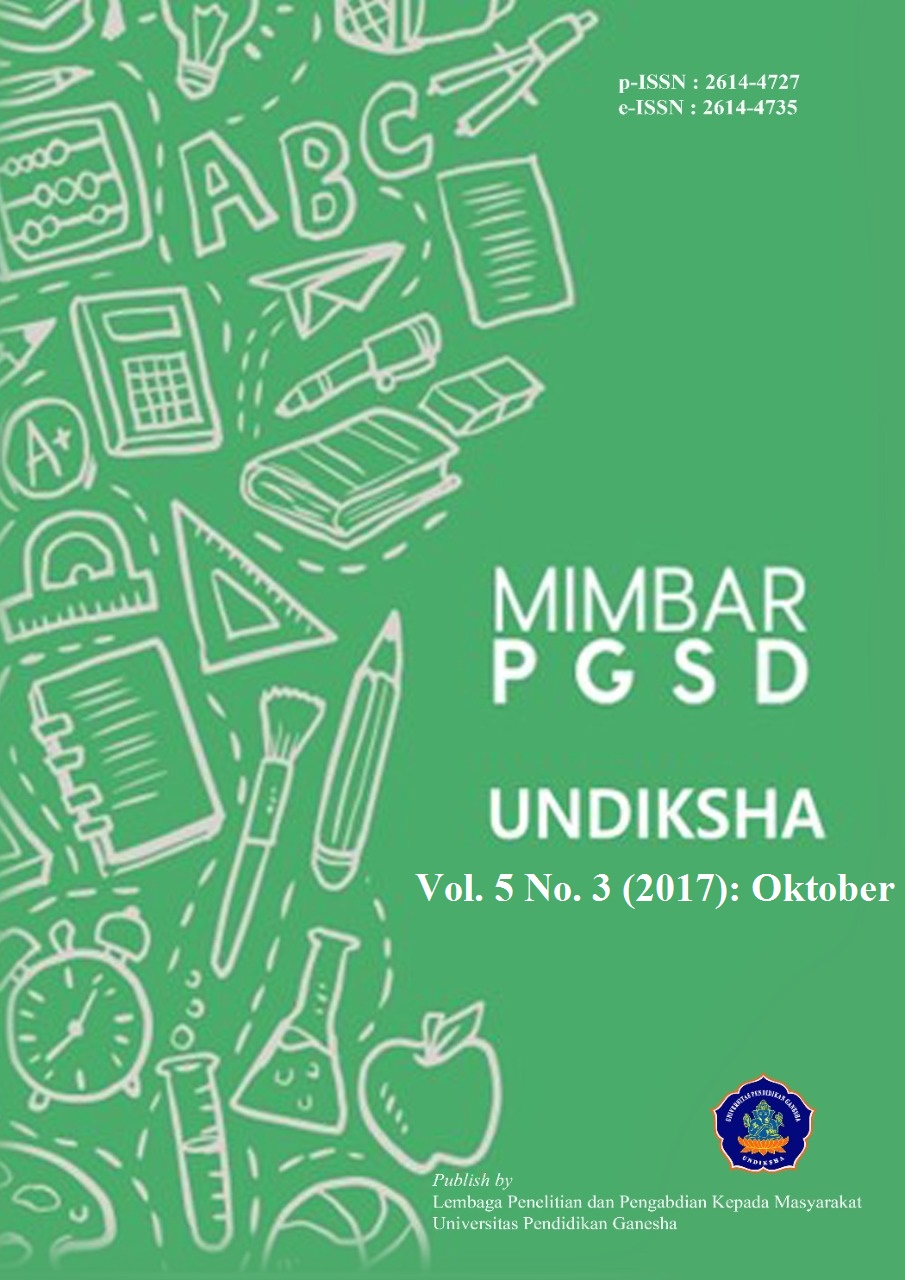PENGARUH MODEL PEMBELAJARAN INKUIRI UNTUK MENINGKATKAN HASIL BELAJAR IPA MELALUI LESSON STUDY SISWA KELAS IV
DOI:
https://doi.org/10.23887/jjpgsd.v5i3.12062Abstract
Penelitian ini bertujuan untuk mengetahui meningkatnya hasil belajar IPA antara siswa yang diajarkan dengan model pembelajaran inkuiri dengan teknik peta pikiran melalui lesson study dengan siswa yang diajarkan dengan pembelajaran konvensional pada siswa kelas IV di SD Mutiara. Penelitian ini merupakan jenis penelitian eksperimen semu dengan desain penelitian Post-test Only Control Group Design. Populasi adalah seluruh siswa kelas IV di SD Mutiara dengan jumlah 70 siswa. Penentuan sampel menggunakan teknik sampling jenuh yaitu dengan cara diundi sebanyak dua kali dengan kelas diberi nomer urut maka diperoleh kelas IV A sebagai kelas kontrol dengan jumlah 35 siswa dan kelas IV B sebagai kelas eksperimen dengan jumlah 35 siswa. Metode pengumpulan data menggunakan metode tes. Data dianalisis menggunakan analisis statistik deskriptif dan statistik inferensial (uju-t). Berdasarkan hasil analisis data diperoleh thitung = 8,129, sedangkan pada taraf signifikan 5% dengan ttabel =1,66. Sehingga terdapat perbedaan yang signifikan hasil belajar IPA kelas eksperimen dan kelas kontol. Hal ini dapat dilihat dari rata-rata kelompok eksperimen dengan rata-rata 21,91 > rata-rata 14,51 pada kelompok kontrol. Oleh sebah itu dapat disimpulkan bahwa penggunaan model pembelajaran inkuiri dengan teknik peta pikiran melalui lesson study berpengaruh untuk meningkatkan hasil belajar IPA kelas IV di SD Mutiara.Kata Kunci : model pembelajaran inkuiri, hasil belajar IPA.
This study aims to determine the increase of science learning outcomes between students taught by inquiry model with mind map techniques through lesson study with students taught by conventional learning in fourth grade students in SD Mutiara. This research is a kind of quasi-experimental research with Post-test Design Design Only Control Group Design. The population is all the fourth grade students in SD Mutiara with the number of 70 students. Determination of samples using saturated sampling technique is by drawing twice with the class given the serial number then obtained class IV A as a control class with the number of 35 students and grade IV B as an experimental class with a total of 35 students. Methods of data collection using test methods. Data were analyzed using descriptive statistics and inferential statistics (uju-t). Based on result of data analysis obtained tcount = 8,129, while at significant level 5% with ttabel = 1,66. So there is a significant difference of experimental science class learning result and class of dick. This can be seen from the average experimental group with an average of 21.91> an average of 14.51 in the control group. By sebah it can be concluded that the use of inquiry learning model with mind map technique through lesson study has an effect to improve the learning result of science class IV in SD Mutiara singaraja.
keyword : inquiry learning model, science learning outcomes.
Published
2017-10-17
How to Cite
., N. K. P. W., ., D. I. K. D. M., & ., P. D. I. K. D. (2017). PENGARUH MODEL PEMBELAJARAN INKUIRI UNTUK MENINGKATKAN HASIL BELAJAR IPA MELALUI LESSON STUDY SISWA KELAS IV. MIMBAR PGSD Undiksha, 5(3). https://doi.org/10.23887/jjpgsd.v5i3.12062
Issue
Section
Articles
License
Authors who publish with the Mimbar PGSD Undiksha agree to the following terms:
- Authors retain copyright and grant the journal the right of first publication with the work simultaneously licensed under a Creative Commons Attribution License (CC BY-SA 4.0) that allows others to share the work with an acknowledgment of the work's authorship and initial publication in this journal.
- Authors are able to enter into separate, additional contractual arrangements for the non-exclusive distribution of the journal's published version of the work (e.g., post it to an institutional repository or publish it in a book), with an acknowledgment of its initial publication in this journal.
- Authors are permitted and encouraged to post their work online (e.g., in institutional repositories or on their website) prior to and during the submission process, as it can lead to productive exchanges, as well as earlier and greater citation of published work. (See The Effect of Open Access)













